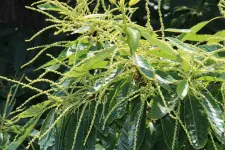(Press-News.org) One of the key mutations seen in the 'Alpha variant' of SARS-CoV-2 - the deletion of two amino acids, H69/V70 - enables the virus to overcome chinks in its armour as it evolves, say an international team of scientists.
SARS-CoV-2 is a coronavirus, so named because spike proteins on its surface give it the appearance of a crown ('corona'). The spike proteins bind to ACE2, a protein receptor found on the surface of cells in our body. Both the spike protein and ACE2 are then cleaved, allowing genetic material from the virus to enter the host cell. The virus manipulates the host cell's machinery to allow the virus to replicate and spread.
As SARS-CoV-2 divides and replicates, errors in its genetic makeup cause it to mutate. Some mutations make the virus more transmissible or more infectious, some help it evade the immune response, potentially making vaccines less effective, while others have little effect.
Towards the end of 2020, Cambridge scientists observed SARS-CoV-2 mutating in the case of an immunocompromised patient treated with convalescent plasma. In particular, they saw the emergence of a key mutation - the deletion of two amino acids, H69/V70, in the spike protein. This deletion was later found in B1.1.7, the variant that led to the UK being forced once again into strict lockdown in December (now referred to as the 'Alpha variant').
Now, in research published in the journal Cell Reports, researchers show that the deletion H69/V70 is present in more than 600,000 SARS-CoV-2 genome sequences worldwide, and has seen global expansion, particularly across much of Europe, Africa and Asia.
The research was led by scientists at the University of Cambridge, MRC-University of Glasgow Centre for Virus Research, The Pirbright Institute, MRC Laboratory of Molecular Biology, and Vir Biotechnology.
Professor Ravi Gupta from the Cambridge Institute of Therapeutic Immunology and Infectious Disease at the University of Cambridge, the study's senior author, said: "Although we first saw this mutation in an immunocompromised patient and then in the Kent - now 'Alpha' - variant, when we looked at samples from around the world, we saw that this mutation has occurred and spread multiple times independently."
Working under secure conditions, Professor Gupta and colleagues used a 'pseudotype virus' - a harmless virus that displays SARS-CoV-2 spike proteins with the H69/V70 deletion - to understand how the spike protein interacts with host cells and what makes this mutation so important.
When they tested this virus against blood sera taken from fifteen individuals who had recovered from infection, they found that the deletion did not allow the virus to 'escape' neutralising antibodies made after being vaccinated or after previous infection. Instead, the team found that the deletion makes the virus twice as infective - that is, at breaking into the host's cells - as a virus that dominated global infections during the latter half of 2020. This was because virus particles carrying the deletion had a greater number of mature spike proteins on their surface. This allows the virus to then replicate efficiently even when it has other mutations that might otherwise hinder the virus.
"When viruses replicate, any mutations they acquire can act as a double-edged sword: a mutation that enables the virus to evade the immune system might, for example, affect how well it is able to replicate," said Professor Gupta.
"What we saw with the H69/V70 deletion was that in some cases, the deletion helped the virus compensate for the negative effects that came with other mutations which allowed the virus to escape the immune response. In other words, the deletion allowed these variants to have their cake and eat it - they were both better at escaping immunity and more infectious."
Dr Dalan Bailey from The Pirbright Institute, who co-led the research, added: "In evolutionary terms, when a virus develops a weakness, it can lead to its demise, but the H69/V70 deletion means that the virus is able to mutate further than it otherwise would. This is likely to explain why these deletions are now so widespread."
Bo Meng from the Department of Medicine at the University of Cambridge, first author on the paper, said: "Understanding the significance of key mutations is important because it enables us to predict how a new variant might behave in humans when it is first identified. This means we can implement public health and containment strategies early on."
INFORMATION:
The research was supported by Wellcome, the Medical Research Council, the Bill & Melinda Gates Foundation and the National Institute for Health Research (NIHR) Cambridge Biomedical Research Centre.
Reference
Meng, B, Kemp, SA, Papa, G, Datir R, Ferreira, IATM et al. Recurrent emergence of SARS-CoV-2 spike deletion H69/V70 and its role 1 in the variant of concern lineage B.1.1.7. Cell Reports; 8 June 2021; DOI: 10.1016/j.celrep.2021.109292
A conclusive narrative review has found physical punishment of children is not effective in preventing child behavior problems or promoting positive outcomes and instead predicts increases in behavior problems and other poor outcomes over time. The study by an international group of scientists including a researcher from The University of Texas at Austin was published today in The Lancet.
Caregivers in many parts of the world use physical punishment as a response to children's perceived misbehavior: 63% of children between the ages of 2 and 4 worldwide - approximately 250 million children - are regularly subjected ...
Phase 1/2 clinical trial of CoronaVac in 550 children and adolescents aged 3-17 years in China suggests two doses of the vaccine are safe and generate a strong antibody response.
First published data on safety and immune response generated by a COVID-19 vaccine in children as young as 3-years-old supports use of CoronaVac - which was recently approved for emergency use in China among children over 3-years-old - in further studies to inform immunisation strategies.
Two doses of CoronaVac are safe and provoke a strong antibody response among children and adolescents ...
In first-of-its kind research led by a University of Massachusetts Amherst psychotherapy researcher, mental health care patients matched with therapists who had a strong track record of treating the patients' primary concerns had better results than patients who were not so matched.
In addition, this "match effect" was even more beneficial and pronounced for patients with more severe problems and for those who identified as racial or ethnic minorities.
The findings are published in JAMA Psychiatry and the Journal of Consulting and Clinical Psychology.
"One of the things we've been learning in our field ...
PULLMAN, Wash. - A research team led by Washington State University has created a computer model to understand how plants store energy in the thylakoid membrane, a key structure to photosynthesis in plant leaves.
The team confirmed the accuracy of the mathematical model with lab experiments. Their work was recently published in the journal Nature Plants.
"We provided an important piece to the overall puzzle of plant metabolism," said Helmut Kirchhoff, a professor in WSU's Institute of Biological Chemistry and leader of the team who made this discovery. "If we integrate our model into the bigger picture, it may provide a good path for how to improve plants for ...
Two recent collaborative publications by CU Cancer Center members provide insights into how chronic inflammation can serve as a key factor in the development of leukemia and other blood cancers.
Eric Pietras, PhD, CU Cancer Center member and assistant professor in the CU School of Medicine Division of Hematology, and James DeGregori, PhD, deputy director of the CU Cancer Center and professor in the Department of Biochemistry and Molecular Genetics, were corresponding authors on both papers.
Both papers provide support for the theory of adaptive oncogenesis, which was developed by DeGregori. The theory stipulates that chronic inflammation (such ...
AMES, Iowa - During the course of a criminal investigation, it is common for investigators to interview individuals who are exhausted and have had little sleep. While unavoidable in some cases, a new Iowa State University study found sleep disruption or deprivation may limit the amount of information provided during an interview.
The study, published in the academic journal SLEEP, is one of the first to look at how sleep affects behavior during interrogations or interviews. Zlatan Krizan, an ISU professor of psychology, says while beliefs about the impact of sleep on interrogation subjects have existed for decades, he and co-authors, ISU professor Christian Meissner and graduate student Anthony Miller, found little direct scientific evidence related to its effectiveness. Krizan ...
A new national study finds that children in the United States with greater screen time usage at ages 9-10 are more likely to gain weight one year later.
The study, publishing in Pediatric Obesity on June 28, found that each additional hour spent on virtually all forms of screen time was associated with a higher body mass index (BMI) one year later. In particular, researchers found that each extra hour spent watching or streaming television, YouTube videos, video games, video chat, and texting led to a higher risk of weight gain one year later. At the start of the study, 33.7% of children were considered overweight ...
Scientists isolated a molecule, extracted from the leaves of the European chestnut tree, with the power to neutralize dangerous, drug-resistant staph bacteria. Frontiers in Pharmacology published the finding, led by scientists at Emory University.
The researchers dubbed the molecule Castaneroxy A, after the genus of the European chestnut, Castanea. The use of chestnut leaves in traditional folk remedies in rural Italy inspired the research.
"We were able to isolate this molecule, new to science, that occurs only in very tiny quantities in the chestnut leaves," says Cassandra Quave, senior author of the paper and associate professor in Emory's Center for the Study of Human Health and the School of Medicine's ...
COLUMBUS, Ohio -- Mountaintop glacier ice in the tropics of all four hemispheres covers significantly less area -- in one case as much as 93% less -- than it did just 50 years ago, a new study has found.
The study, published online recently in the journal Global and Planetary Change, found that a glacier near Puncak Jaya, in Papua New Guinea, lost about 93% of its ice over a 38-year period from 1980 to 2018. Between 1986 and 2017 the area covered by glaciers on top of Kilimanjaro in Africa decreased by nearly 71%.
The study is the first to combine NASA satellite imagery with data from ice cores drilled during field expeditions on tropical ...
Cunjiang Yu, Bill D. Cook Associate Professor of Mechanical Engineering at the University of Houston, is reporting the development of a camera with a curvy, adaptable imaging sensor that could improve image quality in endoscopes, night-vision goggles, artificial compound eyes and fish-eye cameras.
"Existing curvy imagers are either flexible but not compatible with tunable focal surfaces, or stretchable but with low pixel density and pixel fill factors," reports Yu in Nature Electronics. "The new imager with kirigami design has a high pixel fill factor, before stretching, of 78% and can retain its optoelectronic performance while being biaxially stretched by 30%."
Modern digital camera systems using conventional rigid, flat imaging sensors require ...




